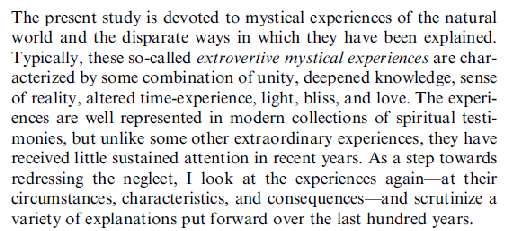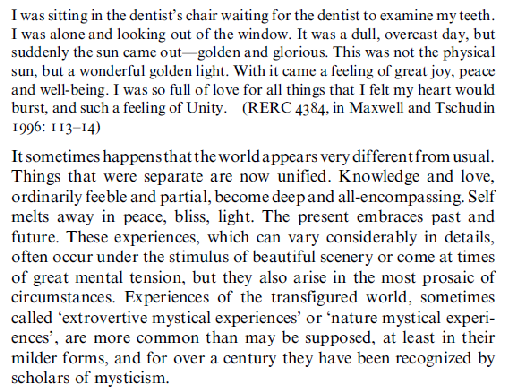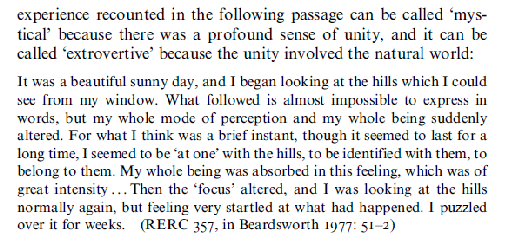Dr. Taylor’s story is well-known from her riveting TED Talks lecture that has spread so far and fast on YouTube. She retells it with greater detail, more background information and a brief look at the significance of such experiences for all of us in My Stroke of Insight (A Brain Scientist’s Personal Journey).
My first reaction to her story was to think how much like my own single psychedelic experience back in the 60’s this was, or how much like Aldous Huxley’s as described in his Doors of Perception. But then I realized, too, that hers was a near-death experience also. And today, happening to recall Goethe’s dying words (“More light.”) it occurs to me that where we usually think the great Enlightenment figure was requesting more light, he might as well have been reporting.
It is not necessary either to use psychotropic drugs or suffer a stroke (or die) to experience this indelible and completely enrapturing mode of relating with the world outside the usual realm of consciousness – nor is it certain, of course, that any of those three actions will produce results like Dr. Taylor’s. But it gives a person pause to think that really quite a few people have had something very like this experience.
I want to explore some of the reports. My thought or intention is to build up my own confidence in the real accessibility of this mode of relating with the world.
Since writing that, I see that there is a book by Paul Marshall, Mystical Encounters with the Natural World (Oxford UP, 2005) that appears to fulfill exactly the program I had in mind, but with scholarly thoroughness. Also, he goes beyond just detailing many specific instances of Dr. Jill’s kind of experience to an examination of the many explanations that may be offered for them.
Here is the opening paragraph of his Preface and Acknowledgements:

His Introduction opens with a quote, a typical personal experience:

I am quoting via screen clippings from a pdf version of his opening pages that I found on line somewhere I no longer have a record of. It does not permit copying and pasting. As the book is available as an ebook for a hefty $134 right now, and more in person, I have yet to decide to download the whole thing.
Here is the only other instance of a mystical union experience Marshall gives in his introduction:

I don’t believe there is at present any way of “proving” some explanation for these extrovertive mystical experiences, and I note that Marshall studies a wide variety. I think there is room for faith in the matter. And my own preference is for what Marshall points to here:

I think we are intuiting or discovering mind in the world at large. And in our deaths as in these passing moments of mystical experience we come into a grander, larger experience of mind than we get in the too-restricted experiences available to us in our tight identity systems. (See The Campfire Picture.)
Materials that bolster this faith of mine are numerous and come from a wide variety of sources. My own personal experience counts the most, of course. That makes it easy for me to identify with Dr. Taylor’s personal experience. Or with Huxley’s experience, also very well described. I might also suggest to the reader that s/he have a listen to this recording of a trialogue among Rupert Sheldrake, Terence McKenna and Ralph Abraham at the Esalen Institute in September of 1989 or 90. The talk among those friends is edited into Chaos, Creativity, and Cosmic Consciousness and found there in Chapter Five, “Light and Vision,” starting on page 75 of the soft cover edition. Sheldrake opens that discussion with a lucid statement of his own elaboration of Bergson’s thinking about vision and the brain. (Bergson, Matter and Memory, 1912.)
I wrote that paragraph back in May of 2011. Since then, I have read much more that confirms my faith or belief or confidence in the many stories, tales and studies in the afterlife, near-death experiences, and the generally paranormal or non-local. There is a brief list of sources for that in this note to the Fifth Remembrance 1 page.
In Doors of Perception Aldous Huxley says, “To make biological survival possible, Mind at Large has to be funneled through the reducing valve of the brain and nervous system.” As he points out, this is a way of viewing life suggested by philosophers C. D. Broad and Henri Bergson. Here is the relevant paragraph, and here is the entire book on line.
The wit, charm, intelligence and erudition of these three interlocutors recommend this recording quite powerfully without regard to the content. However, I must say that for me, hearing Sheldrake’s elucidation of Bergson’s theory of vision was a rather stunning epiphany that has altogether changed my understanding of the world. To be less dramatic and more accurate, it took a second listening and a good deal of reading around before I could adopt their view as my own, but this does leave me feeling that the emperor is wearing no clothes and not very many of us can see that.
I describe my own experience here.

pending
| The Fifth Remembrance 1 |
| The Fifth Remembrance 2 |
| The Fifth Remembrance 3 |
| Dr. Block and Isys 1 |
| Dr. Block and Isys 2 |
| Dr. Taylor and near death 1 |
| Doris's Death |
| Whose journey? Whose truth? |


